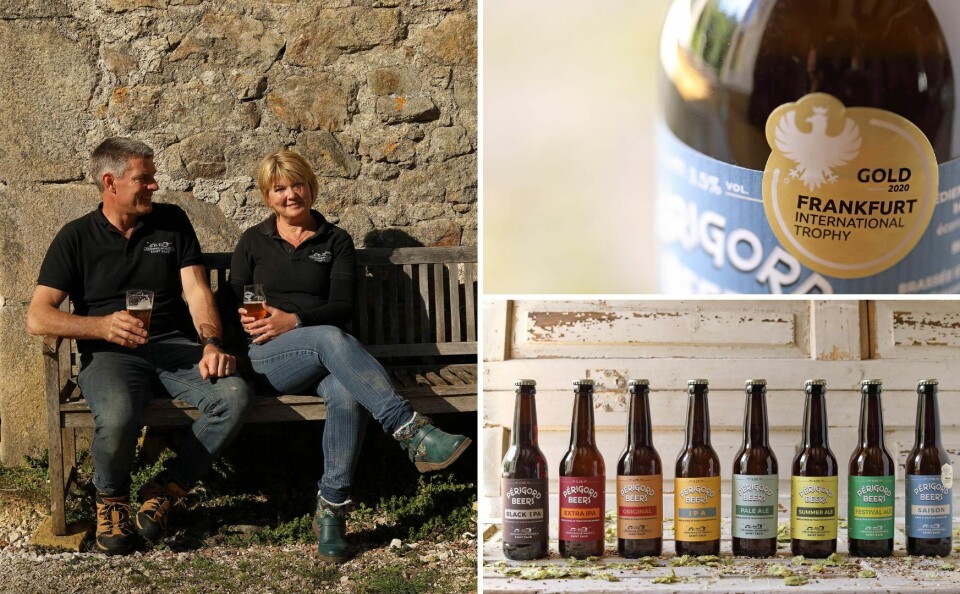-
Rugby vocabulary to know if watching the Six Nations in France
From un tampon to une cathédrale, understand the meaning of key French rugby terms
-
Duck Cold! Four French phrases to use when it is freezing outside
We remind you of French expressions to use to describe the drop in temperature
-
When and why do we say le moral dans les chaussettes?
We explore this useful expression that describes low spirits
Brewing British-style beer in the Dordogne that the French love
A UK couple share their microbrewing story and how barley is so important in creating dry English beer

Living in the Dordogne, Valerie and Michael Povey started their micro-brewery La Brasserie Artisanale de Saint Saud (known locally as ‘Périgord Beers’) thinking it would be fun, almost a part-time hobby.
“We moved from the UK in 2005,” says Valerie, “and we brought some English beers over for Michael’s 40th birthday party. The French people at the party loved them and asked where they could buy some.”
At that time it was quite hard to buy English beer in France.
“All the bars had the same mass-produced beers, and we just joked about brewing our own.”
Michael was a maintenance and landscape gardener and Valerie was working for a company doing online training.
“We eventually set the brewery up in 2016, and very quickly realised it would be a full-time thing.”
Read more: Meet the French craft beer brewers taking wine drinkers by storm
They trained and got permissions to set up the brewery
They took various brewing courses in the UK because the aim was to make British-style beers, and Michael spent some time working at a friend’s brewery.
In France, they registered the business with the Chambre des Métiers and contacted the douanes to let them know they were producing beers because there is duty payable on it.
“We had a meeting with the customs people who were very helpful and efficient. They helped us sort it all out and now we declare our production to them every month.”
Valerie and Michael also obtained permission to make beer, which involved getting approval for a change of use for the building.
They acquired a licence to retail beer from the premises.
“We have a very small shop with a tasting room. We had to comply with the guidelines for allowing public into the building, providing disabled toilets, respecting fire regulations etc, because the general public visit the brewery to see how we make our beer.
“We only do that by appointment though, because we’re too busy to have someone permanently on hand just in case. We also wholesale our beers to other businesses.”
Read more: Map: our tour of France by local apéritif
It takes four weeks to make beer
They make just under 400 hectolitres (40,000 litres) of beer a year, brewing 1,000 litres on average once a week.
“It takes four weeks to make beer; one day of initial work, then a week of fermentation, then a week in the bottle for a secondary fermentation and then two weeks in a cold room before we sell it.”
They buy in hops from all over the world, and malt from a company which imports it from the UK, and from a malt producer in Charente.
“Suppliers are struggling to meet demand. There are so many micro-breweries now! When we set up there were just seven registered micro-breweries in the Dordogne, but now there are more than 40.”
She doesn’t feel there is too much competition
“Every micro-brewery makes different beers, each with its own personality. It means people can find a style they like, which is great. It’s an explosion of new tastes.
“For some of our beers, we infuse elderflowers from the garden into the beer, but we only make it when the elderflowers are blossoming in the spring. People love things like that. We also use ginger, lemongrass, coriander, and orange peel.”
Most customers are French
The difference between French- and UK-style beers is mainly in the type of barley used.
When making UK beers, the hot water is added to the malted barley at a different temperature, which makes the beer not so sweet. Fermenting the beer turns it into ale.
“We thought we’d be selling mainly to British customers but that’s not the case at all. During covid nearly all of our customers were French and they’ve stayed French.
“We sell kegs to French and British bars, plus bottles to restaurants, because they don’t sell enough to make kegs worthwhile. I’d say our sales are 50% kegs and 50% bottles.”
“At the moment we’re not bio, but we want to develop an organic range because there is a demand for it. So we’re in the process of speaking to the certification people to check how to go about it.”
Apart from that, the couple have no plans to expand. “We would like to stay small and family run. We enjoy the personal service we provide.”
Related article
Four boozy French phrases to describe having drunk too much
Motorists 20 times more likely to be breathalysed in France than in UK
‘Tchin tchin’, ‘santé’, eye contact: The rituals of French apéros
























